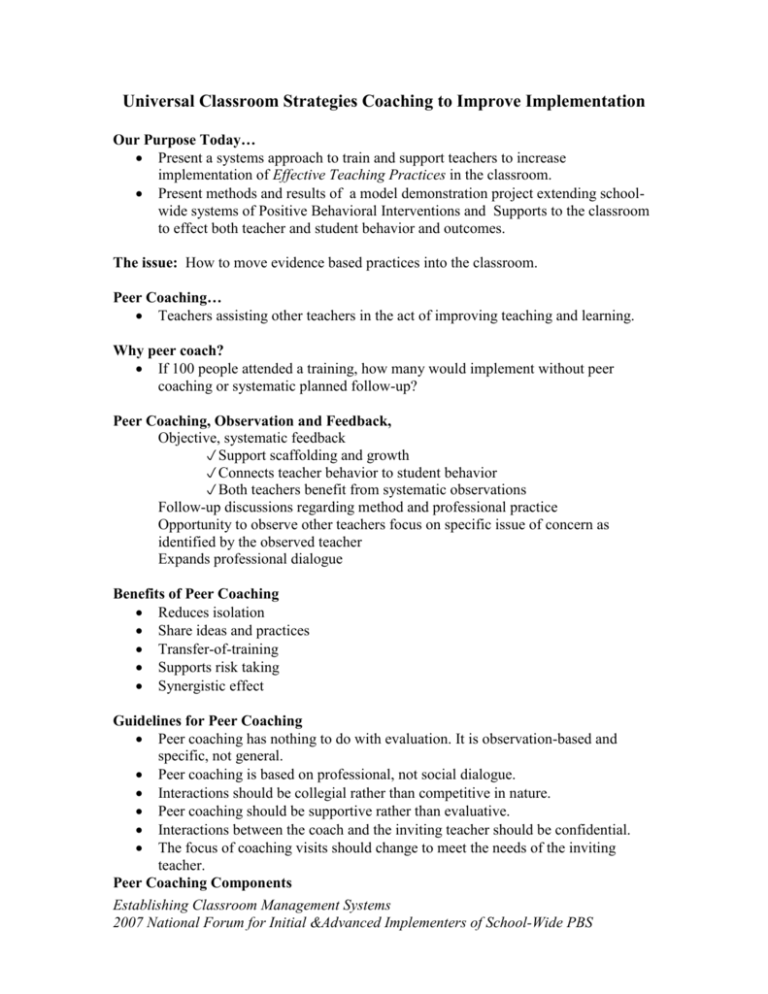Universal Classroom Strategies Coaching to Improve
advertisement

Universal Classroom Strategies Coaching to Improve Implementation Our Purpose Today… Present a systems approach to train and support teachers to increase implementation of Effective Teaching Practices in the classroom. Present methods and results of a model demonstration project extending schoolwide systems of Positive Behavioral Interventions and Supports to the classroom to effect both teacher and student behavior and outcomes. The issue: How to move evidence based practices into the classroom. Peer Coaching… Teachers assisting other teachers in the act of improving teaching and learning. Why peer coach? If 100 people attended a training, how many would implement without peer coaching or systematic planned follow-up? Peer Coaching, Observation and Feedback, Objective, systematic feedback Support scaffolding and growth Connects teacher behavior to student behavior Both teachers benefit from systematic observations Follow-up discussions regarding method and professional practice Opportunity to observe other teachers focus on specific issue of concern as identified by the observed teacher Expands professional dialogue Benefits of Peer Coaching Reduces isolation Share ideas and practices Transfer-of-training Supports risk taking Synergistic effect Guidelines for Peer Coaching Peer coaching has nothing to do with evaluation. It is observation-based and specific, not general. Peer coaching is based on professional, not social dialogue. Interactions should be collegial rather than competitive in nature. Peer coaching should be supportive rather than evaluative. Interactions between the coach and the inviting teacher should be confidential. The focus of coaching visits should change to meet the needs of the inviting teacher. Peer Coaching Components Establishing Classroom Management Systems 2007 National Forum for Initial &Advanced Implementers of School-Wide PBS Pre-conference (5 – 10 minutes) Observation (20 – 50 minutes) Post-conference (10 – 30 minutes) Post-Conference Teacher Objectives Express feelings about the lesson. Recall student behaviors observed during the lesson to support feelings Recall own behavior during the lesson Compare teacher behavior performed with teacher behavior desired. Make inferences to the achievement of the purposes of the lesson Analyze why the student behaviors were/were not performed. Generate future plans Post-Observation: Coach Objectives Describe rather than judge. Assist teacher in identifying specific causes and effects Share ideas rather than give advice Explore alternatives rather than give solutions Provide feedback valuable for the receiver rather than the giver and only give the amount the receiver can use. How they did it… Identify Quantifiable Variables Data Survey Classroom self-assessment Training: Universal Classroom (Effective Teaching) Strategies Pre-correction Strategy Active Participation (Student Engagement) Teacher-Student Interactions Training: Peer Coaching Conferencing skills Feedback Observation and data collection Scheduling The greatest challenge! What does research tell us about providing feedback to improve professional practice? Graphic feedback more powerful than verbal or written feedback. Feedback with reinforcement or goal setting is more powerful than just feedback. Daily and weekly feedback more powerful than monthly feedback. Feedback on performance compared to a standard performance was found to be the most powerful. Putman, R.F., Handler, M., & Davis, C. (2004), Establishing Active Supervision Practices and Systems, May Institute. Establishing Classroom Management Systems 2007 National Forum for Initial &Advanced Implementers of School-Wide PBS Taking it further… Reduce the number of critical teaching behaviors identified to support through peer coaching Lengthen the time between coaching sessions Self select peer coaches Provide graphed feedback in addition to verbal and written feedback Compare to a standard Teachers self monitor critical teaching behaviors Expand Peer Coaching o Literacy o Level of questions Additional Systems of Support Could reading coaches provide feedback/coach teachers in the area of classroom management? Post Organizer: Review The PBIS Team saw their job was to guarantee children are in classrooms in which student-teacher interactions meet the standard of 4 to 1, and students are engaged in learning. How can Peer Coaching support this statement? Establishing Classroom Management Systems 2007 National Forum for Initial &Advanced Implementers of School-Wide PBS






